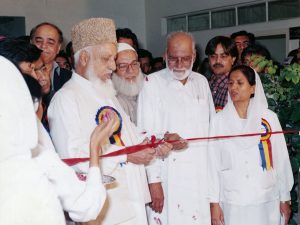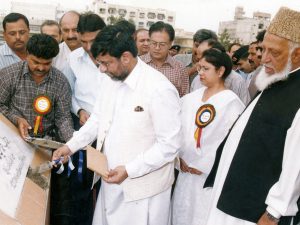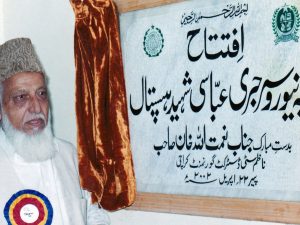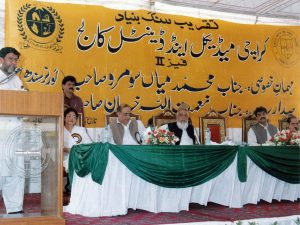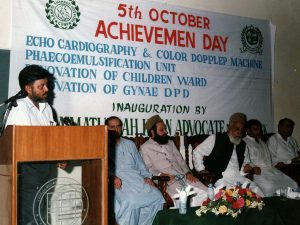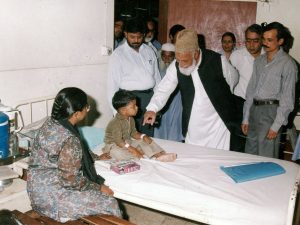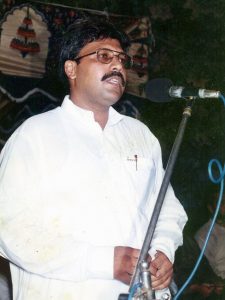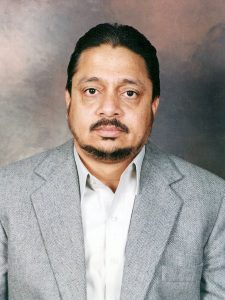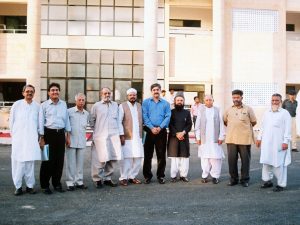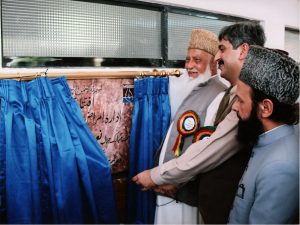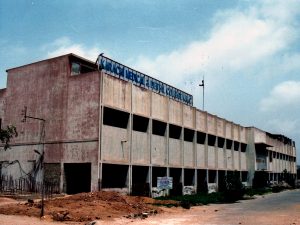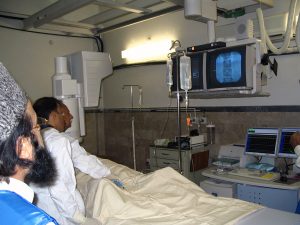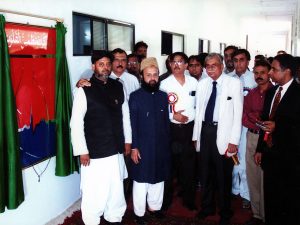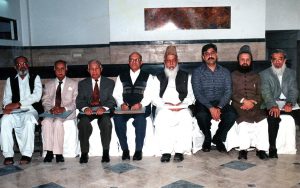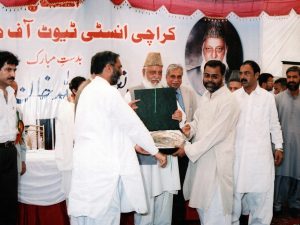KIHD : A DREAM THAT CAME TRUE
Steps taken to improve Abbasi Shaheed Hospital
Abbasi Shaheed Abbasi was the largest hospital operating under the city government. It had been the subject of so many appointments on the basis of political or personal affiliations in different eras that it was a hub of political activities, and the administration seemed helpless due to the activists. It isn’t easy to put the state of affairs into words. You can gauge the situation from the fact that the neurosurgery department had been closed several months prior to my mayorship. Dr. Syed Khalid Hussain – who came from the US with the ambition to serve the nation – had resigned from his post and returned after being beaten and humiliated at the hands of a sector in-charge.
Is it imaginable for the neurosurgery department of an 800-bed tertiary care teaching hospital in the center of the city to remain shut for several months, even with a very large trauma center? Also, the X-ray department was also lying shut for 10 months and the CT scan machine wasn’t working! Moreover, a grave issue for the doctors was the four-tier formula of promotion, delayed since 1997. The hospital’s MS, Dr. Azfar Moeed, was an extremely honest and sincere professional. I appointed Dr. Humayun Farrukh, a long-time employee of the hospital, as its DMS. In the forthcoming days, Dr. Azfar Moeed, Dr. Humayun Farrukh, Dr Saleemullah, Dr. Muhammad Khalid, Dr. Zafar Iqbal, Dr. Abdullah Muttaqi, Dr. Sultan Mustafa, Dr. Faiz Farooqui, Dr. Aurangzeb, Dr. Mohammad Shakeel and Dr. Faiyaz Alam worked extraordinarily to boost the hospital’s service.
The issue related to promotion of doctors now stood resolved. Among other measures, a stipend was approved for postgraduate trainee doctors, a substantial increase was made in the monthly stipend for the (women) students of nursing college, an X-ray machine, six ultrasound machines and a Color Doppler machine were bought for the radiology department, and equipment worth millions were acquired for the laboratory, medicine, surgery and eye diseases sections. The hospital was now offering free-of-cost dialysis and more machines were inducted. The neurosurgery department was reopened on April 22, 2002 and renowned neurosurgeon Prof. Masood Javed sahib – who had previously served as the trauma center in-charge – was made its head. There was no medical ICU at the healthcare facility. We dedicated the third floor for the purpose and bought monitors and ventilators at the cost of millions. It was later inaugurated by Mustafa Kamal. The grave issue of the hospital’s sewerage was solved, besides new water and sewerage lines for the nursing hostel and the building’s beautification. During our four years in power, the patients were able to get 90pc of their medicines completely free of cost, and most tests from a built-in lab. If I had been given the powers by the chief minister for appointments, we would have hired medical and nonmedical staff based on merit, which would have further boosted the services. Sadly, Dr. Arbab Ghulam Rahim appeared completely powerless against MQM on Karachi’s affairs. If I’m asked what I gave to the city as a mayor, the two projects I can promptly name are Karachi Institute of Heart Diseases and K-3 – the proposed project to provide 100 million gallons of water to the city every day. The importance and efficacy of these projects was certainly extraordinary.
Karachi Institute of Heart Diseases (KIHD)
The idea of a new hospital dedicated for heart diseases was put forth by Dr. Faiyaz Alam, and the feasibility was assessed and developed into a document by Deputy Medical Superintendent, Abbasi Shaheed Hospital, Dr. Mohammad Khalid and Dr. Zahid Rasheed, an expert in heart diseases. On September 22, 2002, in a meeting held in a committee room of Civic Center, Prof. Dr. Abdul Samad briefed the participants at length about the heart patients and their treatment in the city. Despite facing the prolonged issue of high blood pressure, I didn’t know Prof. Dr. Abdul Samad as I used to see Prof. Azhar Farooqui. Abdul Samad sahib adorned a sherwani and karakul hat, with an appearance of an Islamic scholar. He originally belonged to Khyber Pakhtunkhwa and he had been residing in Karachi for a long time. He met me at the briefing in a loving and earnest way. The other attendees were DCO Shafiq-ur-Rehman Paracha, EDO Finance Shoaib Siddiqui, EDO Works, EDO Health Dr. Ali Nawaz Sheikh, Dr. Humayun Farrukh, Dr. Zahid Rasheed, Dr. Mohammad Khalid, Dr. Faiyaz Alam, Dr. Zafar Iqbal, Dr. Sultan Mustafa, Dr. Abdullah Muttaqi and Abid Ilyas.
Dr. Zahid detailed that the 400-bed tertiary-care teaching hospital will be completed in two phases. He also said that chest pain centers will be set up in 10 towns, where cardiac arrest patients will receive first aid under the supervision of skilled doctors and staff. He added that those requiring angiography, angioplasty or a bypass surgery will be moved to the central institute. All participants were now convinced, and they decided for the construction to take place on a plot next to the old building of Karachi Medical and Dental College in Federal B. Area’s block 16. We decided to appoint Dr. Abdul Samad as project director and Dr. Khalid and Dr. Zahid as deputy directors. Alhamdulillah, members of the City Council openheartedly welcomed the plan and approved it via resolution no. 211 on January 2, 2003. Then, the relevant officers of city government fully demonstrated their administrative skills. Dr. Khalid worked tirelessly and late hours to make it a reality. The foundation stone of phase-I of the project was laid on January 9, 2004. The nearing of phase-I necessitated the procurement of machines and medical equipment. On March 15, 2005, the City Council passed resolution no. 617 – tabled by Muslim Pervez and Saeed Ghani – for the import and purchase of instruments for rupees 71,026,000. The expensive machines were imported directly via LCs [letters of credit], allowing city government a 40pc saving.
Tabina Lari enabled the donation of two ambulances from Habib Oil Mills, her institution, for the hospital.
The approval from the provincial government was necessary for staff’s appointment. As per the procedure, we sent an application to CM Arbab, also stating that the employees will be paid by the city government but being under the pressure of ally MQM, he refrained from giving an approval. To counter this, renowned heart specialists, namely Dr. Abdul Haq, Prof. Dr. Sharif Chaudhry, Prof. Dr. Hamid Shafqat, Prof. Samad Shera, Dr. Hamid Shafqat, Dr. Maqbool Jafri, Dr. Ejaz Vohra, Dr. Mohammad Ishaq, Dr. Hasnaat Sharif, Dr. Khawer Kazmi, Prof. Dr. Sultan Ahmad Shah, Dr. Hasina Chagani and Dr. Ajmal Siddiqui offered to provide honorary services to the hospital. Dr. Zahid began leading the echocardiography section, while Dr. Abdul Haq and Prof. Abdul Samad took hold of the angiography and angioplasty sections. The healthcare facility started to provide OPD, echocardiography and ETT with the available resources. It offered angiography for only Rs3,000 and angioplasty for Rs35,000.
With the grace of God, I formally inaugurated the first phase of the healthcare facility on June 3, 2005. Since the plan included chest pain centers in 10 towns each, our team was in efforts to establish them as well. On June 20-21, 2005, we laid the foundation stone of two chest pain centers in Malir and Korangi, respectively. The ceremonies were attended by the town and Union Council nazims, councilors and people from different walks of life. Jamaat-e-Islami’s women wing leader, respected Ayesha Munawar had donated a sizeable amount of money for Korangi’s chest pain center from her fund as the member of the National Assembly.
Dengue arrives
In 2004, a new disease made inroads into Karachi. At least I had heard its name for the first time. In the initial days, even its name remained unknown but often, newspapers would refer to it as dengue. We had received reports of several deaths. EDO Health briefed us that the virus enters the body through the bite of an infected mosquito, which causes a severe drop in blood platelets. On this occasion, Dr. Tahir Shamsi – a PIMA member and expert in blood-related diseases – was of great help as he organized several training programs. He apprised doctors that the patients will not be prescribed antibiotics, and how their lack of platelets can be overcome. Sajjad Dara – nazim of the Incholi UC – had been associated with an agricultural pesticide company for years. He advised that we carry out an anti-mosquito spray via standard fumigants.
The vector control unit operated under the EDO Health but it wasn’t active as such. Acting on his advice, we bought fogger machines and carried out an emergent spray in every town of the city. The campaign was zealously carried out for several weeks by Sajjad Dara, Dr. Asif Khan and Altamash Khan. Another young officer of the department was visibly active during the drive. I later identified him as Hammad Siddiqui, a key person of the MQM’s headquarters of ‘Nine Zero’. He seemed from a decent family from his way of speaking and demeanor. When I discovered this, I felt remorseful at what Altaf Hussain’s selfish, violent and hatred-based politics had turned the youth of the city into. I just wish he stayed away from the politics that destroyed generations! JI Karachi’s qayyim Shahid Hashmi had often wished to see a state-of-the-art diagnostic center in the metropolis that could provide laboratory, CT scan and MRI services under one roof. Dr. Mohammad Wasay and Dr. Azeemuddin shared their valuable input to implement the idea and the health department generated PC-I of the project in consultation with these experts.
During the initial months of mayor-ship, I was advised to move to a large bungalow situated next to Liaquat National Hospital. I had rejected the idea and responded that Afghani sahib had served the city as the mayor for eight year and he lived in an 80-yard apartment in Lyari and not in the residence provided by the government. By the grace of Allah, I was already living in a large house. Eventually, a team of skilled doctors termed the bungalow suitable to house the diagnostic center. A few days later, tenders were issued for the purchase of machines and civil work at the location and the foundation stone was laid on June 5, 2005. However, my successor abolished the key project. According to some reports, he even turned it into his residence or a camp office. A lot of corruption engulfed the health sector, like other departments, so I constituted vigilance committees to deal with the irregularities taking place in the procurement of machines, purchase and supply of medicines and other similar issues. These were tasked with ensuring the attendance of medical and paramedical staff, cleanliness in hospitals and suggesting ways to further facilitate hospitals. I would detail one incident out of many to give the readers an idea of how such irregularities happen at the state-run departments.
The Children’s Hospital project in North Karachi was in its last stages of completion, and equipment and medical instruments worth millions was to be bought under EDO Health’s supervision. The project’s file was sent to me for final approval once machine procurement was finalized. That’s when one of the doctors – who was working with me as an advisor – revealed that the prices were extraordinarily high. A further research revealed the plan to award the project to blue-eyed suppliers, after having issued the tender through relatively lesser known newspapers. I got the tenders issued in prominent newspapers inducted renowned pathologists in the committee formed to procure equipment. The prices saw a 25pc to 30 pc plunge, while the guarantee also improved from one year to two years. We then constituted a central purchase committee to bring transparency into the process of purchase of medicines and equipment.
An intensive care unit for newborns was set up at Sobhraj Maternity Hospital. Medical Superintendent, Dr. Shabeen Naz was quite active, and she made constant efforts alongside district officer, Dr. Humayun Farrukh and Dr. Abdullah Muttaqi to improve the hospital’s conditions. Likewise, the administration of Spencer Eye Hospital keenly studied the feasibility to enhance their facilities, and briefed me, the DCO and EDO Health about their requirements and project plans. We valued their suggestions and provided them several millions on account of medical equipment and instruments.
New Building for Karachi Medical and Dental College
The city government – in its very first budget – had allotted Rs160 million for the second phase of construction of Karachi Medical and Dental College, situated in North Nazimabad. The development work was formally inaugurated by Governor Sindh Mohammad Mian Soomro in a gracious ceremony on August 16, 2002.
Naib nazim Tariq Hassan, DCO Shafiq-ur-Rehman Paracha, college principal Dr. Sadia Aziz Karim, town nazim Fasihuddin Siddiqui and others graced the occasion. It is pertinent to mention that Saleem Azhar and Abid Ilyas took keen interest in the project. I inaugurated the college on June 6, 2005. Such state-owned projects face years of delay as corrupt elements within the administration and contractors cause the rates to spike. The malpractice by a few puts the development work at stake. Thankfully, the building stood finished in less than three years. In the meantime, we hired lecturers. The hiring in the sector used to be based on political or personal affiliations. I directed the administration to carry out all appointments via Sindh Public Service Commission and only on merit.
This is exactly what happened. Several people told me after receiving their letters of appointment that it would not have been possible if the mayor was from another political party. When Mustafa Kamal became the mayor, he carried out direct hiring at the college and other institutes. The college administration once advised introducing self-finance seats. I consulted my team and rejected the proposal. It was due to the moral principles that I learned as a JI member that I never carried out any promotion or hiring beyond the set regulations or merit during those four years.
![]()
